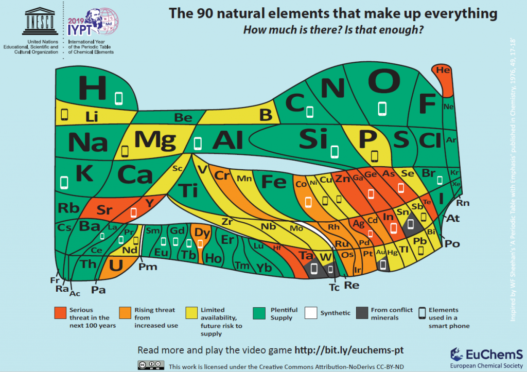When thoughts turn to endangered lists, normally the first things which springs to mind are rain forests and pandas.
However chemical elements in mobile phones and televisions have been placed on their own table of threatened resources.
St Andrews scientists, fresh from revealing they may have the world’s oldest periodic table, have developed a unique version which highlights the scarcity of elements used in everyday devices.
Shockingly, around 10 million smartphones are discarded or replaced every month in the European Union alone.
Smartphones are made up of around 30 elements but more than half of those are giving cause for concern in the years to come because of increasing scarcity.
That may be because of limited supplies, their location in conflict areas, or an incapacity to fully recycle them.
The European Chemical Society, representing more than 160,000 chemists, has developed the modern table to highlight both the remaining availability of all 90 elements and their vulnerability.
With finite resources being swallowed up, EuChemS vice-president and Emeritus Professor in Chemistry at St Andrews, Professor David Cole-Hamilton, has questioned the trend for replacing mobile phones every two years, urging users to recycle old phones correctly.
“It is astonishing that everything in the world is made from just 90 building blocks, the 90 naturally occurring chemical elements.
“There is a finite amount of each and we are using some so fast that they will be dissipated around the world in less than 100 years.
“Many of these elements are endangered, so should you really change your phone every two years?” he asked.
The table, celebrating the 150th anniversary of the original, will be launched at the European Parliament on Tuesday by British MEPs Catherine Stihler and Clare Moody.
Mrs Stihler, former Rector of St Andrews, said: “As we mark the 150th anniversary of the periodic table, it’s fascinating to see it updated for the 21st Century.”
However, the Labour politician added: “But it’s also deeply worrying to see how many elements are on the endangered list, including those which make up mobile phones.
“It is a lesson to us all to care for the world around us, as these naturally-occurring elements won’t last forever unless we increase global recycling rates and governments introduce a genuine circular economy.”
EuChemS president Pilar Goya added the celebration of the International Year of the Periodic Table was a great opportunity to communicate the crucial role of chemistry in overcoming the challenges society will be facing in the near future.










